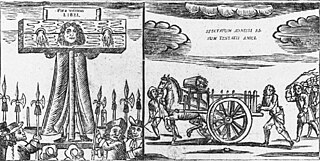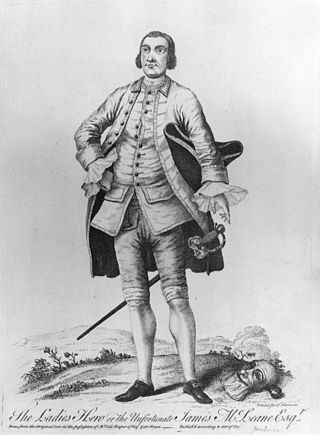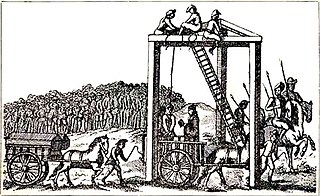Related Research Articles

Theft is the act of taking another person's property or services without that person's permission or consent with the intent to deprive the rightful owner of it. The word theft is also used as a synonym or informal shorthand term for some crimes against property, such as larceny, robbery, embezzlement, extortion, blackmail, or receiving stolen property. In some jurisdictions, theft is considered to be synonymous with larceny, while in others, theft is defined more narrowly. Someone who carries out an act of theft may be described as a "thief".

Newgate Prison was a prison at the corner of Newgate Street and Old Bailey Street just inside the City of London, England, originally at the site of Newgate, a gate in the Roman London Wall. Built in the 12th century and demolished in 1904, the prison was extended and rebuilt many times, and remained in use for over 700 years, from 1188 to 1902.

Richard Turpin was an English highwayman whose exploits were romanticised following his execution in York for horse theft. Turpin may have followed his father's trade as a butcher early in his life but, by the early 1730s, he had joined a gang of deer thieves and, later, became a poacher, burglar, horse thief and killer. He is also known for a fictional 200-mile (320 km) overnight ride from London to York on his horse Black Bess, a story that was made famous by the Victorian novelist William Harrison Ainsworth almost 100 years after Turpin's death.

Shoplifting is the theft of goods from an open retail establishment, typically by concealing a store item on one's person, in pockets, under clothes or in a bag, and leaving the store without paying. With clothing, shoplifters may put on items from the store and leave the store wearing the clothes. The terms shoplifting and shoplifter are not usually defined in law. The crime of shoplifting generally falls under the legal classification of larceny. Shoplifting is distinct from burglary, robbery, or armed robbery. In the retail industry, the word shrinkage can be used to refer to merchandise lost by shoplifting, but the word also includes loss by other means, such as waste, uninsured damage to products and theft by store employees.

Claude Du Vall was a French highwayman in Restoration England. He came from a family of decayed nobility, and worked in the service of exiled royalists who returned to England under King Charles II. Little else is known of his history. According to popular legend, he abhorred violence, showing courtesy to his victims and chivalry to their womenfolk, thus spawning the myth of the romantic highwayman, as taken up by many novelists and playwrights.

Jack Sheppard, or "Honest Jack", was a notorious English thief and prison escapee of early 18th-century London.

Thomas Dangerfield was an English conspirator, who became one of the principal informers in the Popish Plot. His violent death at the hands of the barrister Robert Francis was clearly a homicide, although whether the killing was murder or manslaughter was a matter of considerable public debate at the time.
In archaic terminology, a footpad is a robber or thief specialising in pedestrian victims. The term was used widely from the 16th century until the 19th century, but gradually fell out of common use. A footpad was considered a low criminal, as opposed to the mounted highwayman who in certain cases might gain fame as well as notoriety. Footpads operated during the Elizabethan era and until the beginning of the 19th century.
James Dalton was "captain" of a street robbery gang in 18th-century London, England.

"Captain" James Maclaine was an Irish man of a respectable presbyterian family who had a brief but notorious career as a mounted highwayman in London with his accomplice William Plunkett. He was known as "The Gentleman Highwayman" as a result of his courteous behaviour during his robberies, and obtained a certain kind of celebrity. Notoriously, he held up and robbed Horace Walpole at gunpoint: eventually he was hanged at Tyburn.

James Field was a sailor and boxer in England in the 18th century who was hanged for robbery.
Henry Simms, known as Young Gentlemen Harry, was a thief and highwayman in 18th-century England who was transported to Maryland for theft, but escaped and returned to England, where he was eventually executed for highway robbery.

In English legal history, a thief-taker was a private individual hired to capture criminals. The widespread establishment of professional police in England did not occur until the 19th century. With the rising crime rate and newspapers to bring this to the attention of the public, thief-takers arose to partially fill the void in bringing criminals to justice. These were private individuals much like bounty hunters. However, thief-takers were usually hired by crime victims, while bounty hunters were paid by bail bondsmen to catch fugitives who skipped their court appearances and hence forfeited their bail. Both types also collected bounties offered by the authorities.

Sophie Lyons was an American criminal and one of the country's most notorious female thieves, pickpockets, shoplifters, and confidence women during the mid-to-late 19th century. She and her husbands Ned Lyons, Jim Brady and Billy Burke were among the most sought-after career criminals in the U.S. and Canada, being wanted in several major cities including New York City, Philadelphia, Boston, Detroit and Montreal from the 1860s until the turn of the 20th century.
Jenny Diver, née Mary Young was a notorious Irish pickpocket, one of the most famous of her day.
William Spiggot was a highwayman who was captured by Jonathan Wild's men in 1721. During his trial at the Old Bailey, he at first refused to plead and was therefore sentenced to be pressed until he pleaded. This was called Peine forte et dure. He was later executed, after a second trial when he pleaded not guilty, on 11 February 1721 at Tyburn, London.

Thomas Cox, known as "The Handsome Highwayman", was an English highwayman, sentenced to death and hanged at Tyburn. He had a reputation for a spirited nature and it is reported that when asked if he wished to say a prayer before being hanged, he kicked the ordinary and the hangman out of the cart taking him there.
Deborah Churchill (1677–1708) was a British pickpocket and prostitute executed for being an accomplice to murder in 1708.
Jane Voss alias Jane Roberts, was an English highwayrobber and thief.
Moll King was a 17th-century London criminal.
References
- 1 2 3 4 "Clay, Marcy [alias Jenny Fox] (d. 1665), highwaywoman and thief". Oxford Dictionary of National Biography. doi:10.1093/ref:odnb/73926 . Retrieved 24 April 2022.
- ↑ D'Cruze, Shani (2009). Women, crime and justice in England since 1660. Louise A. Jackson. Basingstoke. p. 53. ISBN 978-1-137-05720-4. OCLC 966545323.